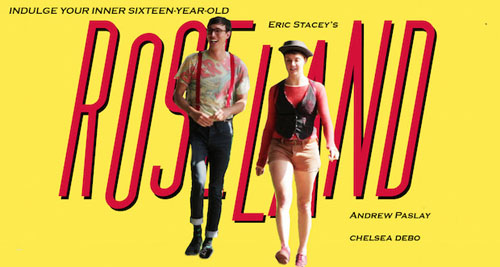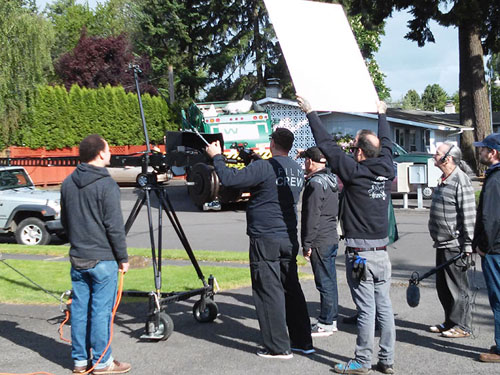

ERIC STACEY WRITER/DIRECTOR/PRODUCER – ‘Roseland’
.
Film Courage: Where did you grow up?
Eric Stacey: I grew up in North Hollywood and Studio City, suburbs of Los Angeles in the San Fernando Valley. By the time I was born, my dad had advanced in his career to work as a Production Manager and then Head of the Production Department at Warner Brothers. He spent the majority of his time either at work, playing golf or going to church, though on the rare times he was between movies, he would putter around the house, painting the patio furniture.
Film Courage: Which of your parents do you resemble most?
Eric: I look more like my mother, and she was probably a bigger influence, because my dad was away so much, but I grew up wanting to be more like my father – someone who I saw as very powerful and influential in his work. The flip side was, my dad complained that I was too sensitive as I was growing up. I still am.
.
“Here’s where I find myself returning to my old school roots. I mean, I don’t feel it’s necessary to shock audiences to entertain, and I’m not interested in competing with filmmakers like Judd Apatow. A good story is a good story. Certainly, there is a big audience of adrenaline junkies looking for bigger boobs and more extreme ‘gross outs.’ But there are also classics like “The Notebook” – hugely successful without needing to find the shock jugular.” Eric Stacey
.
Film Courage: Did your parents lend support toward creativity or encourage another type of career/focus?
Eric: When I was still in grade school I worked as a day player in a few films. “Young At Heart,” and “East of Eden” with James Dean. I loved being on sets, but my parents were afraid it was hurting my school work so the jobs suddenly dried up. They both encouraged me to become a professional – a doctor or lawyer.
.

Film Courage: What were your plans after high school?
Eric: I was seriously into cars. I built hot rods, rode a Triumph Bonneville and raced regularly on Mulholland Drive… (think American Graffiti) …until one night I was racing two undercover cops and when my brakes went out. I went over a cliff. Luckily I wasn’t hurt, but it scared the crap out of me and I felt I’d been given a second chance at doing something with my life.
Film Courage: What was the first movie set your father brought you to?
Eric: It was on a stage at Warner Brothers. A Randolph Scott movie. I have no idea which one. But he was doing something in a teepee with an Indian princess. I was probably six or so. What made a bigger impression was when he took me to see the original “King Kong” with Fay Wray and spent the entire movie telling me how all the stop motion and effects photography was done. Totally ruined the movie for me.
Film Courage: You were born in LA. How did you end up in beautiful Portland, Oregon?
Eric: In 1996, I co-produced the PBS travel series, “America’s Scenic Rail Journeys.” The sponsoring station was Oregon Public Broadcasting and I spent quite a bit of time in Portland, which gave me an opportunity to explore not just Portland, but the Oregon Coast which is one of the most beautiful places on earth. I couldn’t wait to move here, but it took nearly ten years. We moved here in 2005, the year our daughter graduated from college.
Film Courage: What makes Portland’s art/film scene unique?
Eric: There’s a big arts scene in Portland. Compared to LA, Portland is a small town. But we have a good number of well known filmmakers, from stop motion genius Wil Vinton to Gus Van Sant and Travis Knight (Laika Studios – “Coraline”) and a passionate community of actors committed to supporting local indie projects. And, of course we have some big agencies here for commercial work and the occasional LA based series (“Grim,” “Leverage,” and “Portlandia”) which keep everyone primed for the day Portland will become a major production center. There is also a passionate film community which supports the non-profit Hollywood Theater, an old movie palace which has now been updated and feeds film buffs a constant stream of cutting edge and historical films – not to mention some great filmmaking programs for kids.
Film Courage: Do you remember your first teenage crush?
Eric: I remember having a huge crush on a girl who was in my 8th grade class. Unfortunately, I didn’t stand a chance with her because she had a thing for the impossibly handsome quarterback of our touch football team. But we did hang out a lot. She and her sister would have us over to her parents’ house on Mulholland drive to see her dad’s latest films.

Film Courage: Any part of your teen years that you’ve added to your upcoming movie ROSELAND?
Eric: Well, George Wilson, the central character is a kid who didn’t have a great role model for a father and is pretty much has to figure out life on his own. I relate strongly to that. As far as specific events from ROSELAND, there’s one which mirrors the experience of a person I knew when I was a teen – He worked for a creepy old business owner who would pay him to have sex with a hooker so the dealer could watch from an adjoining room and pleasure himself. We all thought he was the luckiest fifteen year old we knew.
.
Film Courage: Where did the idea for ROSELAND develop?
Eric: I came across Sherwood Anderson’s “Winesburg, Ohio” when I was a producer/director working at the UCLA Media Center, making two films for the National Institute for the Humanities (Penelope Spheeris – “Wayne’s World” – was my editor).
Film Courage: How long did the idea for ROSELAND swirl around your head before saying “I’m Making This Movie!”
Eric: I’ve wanted to make Winesburg for decades, but it’s a period piece set at about the same time as “East of Eden” just before the First World War. I could never get traction for a faithful adaptation which would have been hugely expensive and really didn’t fit the Hollywood mold. Hallmark was interested for a time, but it never went anywhere. The script gathered dust for years, and after I’d been in Portland for a few years I thought I could put it together here as a contemporary coming-of-age story… basing many of the characters George encounters at an apartment building rather than his parents’ hotel in Winesburg.

Film Courage: How long did it take to write the script?
Eric: My first effort was nearly twenty years ago. The latest draft is only a few months old, so there have been at least twenty drafts from faithful adaptations to the current version, which is based on little more than the original idea.

Film Courage: What is crucial for your character’s journey throughout the film?
Eric: Dreams. All the characters in ROSELAND are either dreaming about their future or are disappointed over dreams that never came true. My two central characters, George and Kerry, both dream about finding love and becoming independent, which translates well into any generation.

Film Courage: Why are you crowdfunding?
Eric: I’ve made three feature films, “Director’s Cut,” “Purple Mind,” & “Unthinkable: An Airline Captain’s Story.” All were self-financed with “Director’s Cut” being the most expensive as I shot it in LA. Making those three films, I’ve grown a great deal as a film maker. Unfortunately, I can’t afford to make another feature without some serious support and participation, whether it’s from investors or crowdfunders and both the investors I know are deep into their own projects.

Film Courage: Do stories set in the Pacific Northwest different in theme or temperament than those set in Los Angeles or New York?
Eric: It depends. The PNW offers wonderful natural settings for locations. Our costume designer, Marta Hines, just came off last year’s “Wild.” The Paul Newman film, “Sometimes A Great Notion,” was one of the earlier Hollywood films which took advantage of our forests. But Seattle and Portland are both big cities which lend themselves well to urban stories. As far as filmmakers of the PNW are concerned, we’ve got a bunch of great SFX folks, so genre movies and big muscle movies both get made here. What we don’t have is the film finance communities of LA and New York.

Film Courage: Have you shot the film?
Eric: The first week of May I shot the trailer with a great local DP, Kenneth Luba. Drew Paslay and Chelsea Debo, two very talented young LA actors, spent the week with us and the rest of the cast represent some of the most interesting actors in town. Once we meet our minimum finance goal, we’ll gear up again and shoot the entire film paying everyone at least enough to survive. With luck, perhaps more.

Film Courage: Do you think viewers have better connections with “unlucky” geeks or perfect, athletic heroes (or heroines)?
Eric: Drew Paslay’s persona lends itself to the geeky wannabe filmmaker George Wilson (think John Heder, “Napoleon Dynamite”) “Napoleon Dynamite” did really well, so clearly there is an audience for oddball stories about geeky horn-dogs. ROSELAND’s George Wilson becomes more attractive in Kerry White’s eyes than a perfect, athletic hero because at the end of his journey he becomes less focused on himself, stepping out from behind his camera to become an engaged, empathetic young man.

Film Courage: How did you cast your actors for ROSELAND?
Eric: Drew and Chelsea stood out from over 800 actors who submitted through Backstage.com. Happily, they both found the characters of George and Kerry appealing.
Film Courage: We understand you spent $10,000 on your Indiegogo pitch video. Why such an investment when you’re trying to raise money?
Eric: Why would anyone contribute to a film project unless they knew the filmmakers would make a film worth watching? We wanted to let crowdfunders see for themselves the quality of performers and production we’re bringing to ROSELAND. Besides, it’s important for others to know you’ve got some skin in the game.

Film Courage: What on an actor’s reel or website stands out the first time you view them, besides a specific character look?
Eric: The look is key, but what’s really important is whether the actor seems comfortable in his/her own skin. Do they know who they are and how to use what they’ve got to make that character live and breath as a real human being.
Film Courage: Your father, Eric G. Stacey, rose from theater usher to production head of Warner Brothers Studios and beyond. What observations can share you about his work ethic, determination and process handling setbacks?
Eric: My dad came up during the early days of Hollywood. He was the prop man on “The Jazz Singer,” the first “talkie.” He was the first AD on all David O. Selznick’s films. He was a founding member of the Directors Guild of America and, after Warners, was UPM on films like “Breakfast At Tiffany’s,” “South Pacific,” and “The Greatest Story Ever Told.” He knew how to make movies within the Hollywood studio system. Unfortunately, in 1969, an alcoholic Teamster killed him trying to beat a freight train across a crossing in the desert near Lancaster, CA. The irony is that it was the first day of production of a film by Noel Black titled “Run Shadow Run,” about a film student making his first feature.
Film Courage: Your prior documentary, A HOLLYWOOD SCRAPBOOK, explores your dad’s career as a reflection of moral and sexual themes of the “Golden Age of Hollywood” through clips from classic films he helped produce. What’s the current evolution of morality and sexuality?
Eric: I don’t feel qualified to answer that. I mean anybody with a smart phone can watch porn 24 hours a day if they want to. Today, films are made for audiences of all sexual persuasions. Personally, I love women but I also have gay and lesbian friends and even wrote a biography years ago about one of the early transsexuals “Man Made Woman” (never published).
Film Courage: How would films like Porky’s and Fast Times At Ridgemont High fare today regarding shock value?
Eric: Here’s where I find myself returning to my old school roots. I mean, I don’t feel it’s necessary to shock audiences to entertain, and I’m not interested in competing with filmmakers like Judd Apatow. A good story is a good story. Certainly, there is a big audience of adrenaline junkies looking for bigger boobs and more extreme ‘gross outs.’ But there are also classics like “The Notebook” – hugely successful without needing to find the shock jugular.
.png)
Film Courage: Do you think teens in today’s Western society are desensitized and receive the same peer pressure to have sex and grow up fast as prior generations? Do you remember the messages you received from peers about growing up and ‘becoming a man?’
Eric: I think this is a question more about the narcissistic culture we live in. It’s not about peer pressure, it’s about the values we are presented with by mainstream media. The four-year-old girl who competes in a toddler beauty pageant lives in a world of TV values where appearances trump feelings, where dignity and integrity no longer exist. When I was in my twenties, I thought Hugh Hefner was a genius, but as a culture we’re still fighting a war between objectifying women and reinventing the roles men and women play in life, work and love. And it’s all happening, courtesy of corporate sponsors, right on your TV. Case in point, Bruce Jenner’s journey to become Caitlyn Jenner. – Who are these people? Why are they important to us? I believe these are the important questions.

Film Courage: First romantic comedy you watched as a teen and its affect on you?
Eric: I would have to say that was Stanley Kubrick’s “Lolita” with James Mason and Peter Sellers. At the time, I found the James Mason character, an older guy crazy in love with his step-daughter, a bit pathetic. Like Sherwood Anderson, it seems to me that traditional morals are the culprits behind people cut off from their feelings, suffering unhappiness and loneliness which keep us apart. Then, of course there was “The Graduate.” Lets join in with Simon and Garfunkle… “Hide it in a hiding place where no one ever goes. Put it in your pantry with your cupcakes. It’s a little secret just the Robinson’s affair. Most of all you’ve got to hide it from the kids.” (Simon & Garfunkle – “Mrs Robinson”) Can you tell I’m a product of The Sixties?
Film Courage: Having perspective of Los Angeles/Hollywood and the fickle nature of the entertainment industry versus Oregon, what’s your take on life in other parts of the U.S., remaining creative no matter where you reside?
Eric: I think that no matter where you live, it’s fun to make-believe. It’s fun to tell stories. It’s fun to make films. If there is a problem with “the industry,” it is taking yourself so seriously that you forget who you are and what is real. I say that at the ripe old age of seventy, still spending months and years at my desk making films instead of going fishing or skiing on Mount Hood. By Hollywood standards I am a failure. By my own standards, I have made a few films that have meant something to other people and by that metric I am a success. Michael Moore didn’t need Hollywood. Hollywood needs us… people with stories to tell that reflect what’s going on in the world. Some of them make money. Many don’t.
Film Courage: If an actor from the Pacific Northwest said “I’m Leaving Home for Hollywood,” your advice would be?
Eric: Everybody is on their own path. Nobody asks my advice.
Film Courage: Of the numerous writing/producing/directing credits on your IMDB page, which productions taught you the most? How have you incorporated these lessons into other work?
Eric: I worked as a DGA Key Second AD on a few films when I was in my thirties. I quickly got tired of sixteen hour days and having a hundred people on set when twenty could do the same job for a lot less money. That’s what attracted me to documentaries. You can go out and make a movie by yourself if you want to. I’ve done a few that way (“The Waldorf Promise,” “A Passion for Sustainability”). I like to keep it simple. Life is much more enjoyable that way.
Film Courage: What’s next for you creatively?
Eric: Making “ROSELAND” the best low-budget film it can be. Finishing the greenhouse out back. Electing Bernie Sanders President.
ABOUT THE FILMMAKER:
Emerging from the bowels of The American Film Institute and the U.C.L.A. Media Center during the 1970s, Eric Stacey has worked as a screenwriter, an Assistant Director and actor on major Hollywood movies, but for the past twenty years as an award winning filmmaker. Roseland will be Eric’s fourth feature film.
.
.
CONNECT WITH ERIC STACEY AND ROSELAND:
Twitter
Indiegogo
Facebook
IMDB
.
























